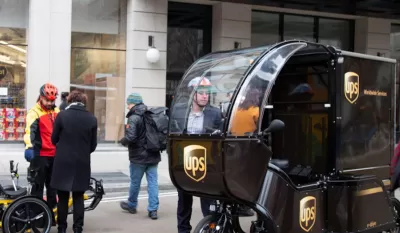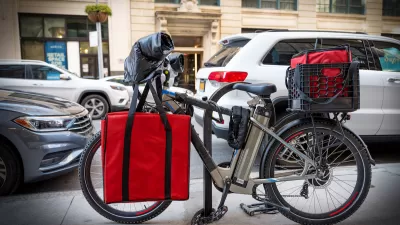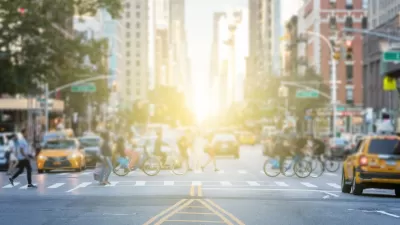Cargo bike producers and delivery companies say the proposed 120-inch length limit and emphasis on four-wheeled bikes excludes many commonly used delivery bikes and favors one manufacturer.

When the New York City Department of Transportation (NYCDOT) announced a proposed rule revision that would make way for larger cargo bikes in the city, bike advocates hailed it as a victory. But freight industry leaders say the change would outlaw some of the most common delivery bikes and skew the market toward one particular manufacturer, writes Gersh Kuntzman in Streetsblog NYC.
The new rules would explicitly allow four-wheeled, pedal-assist cargo bikes—just the kind that the city’s Department of Transportation is testing. But, as Kuntzman explains, “Those bikes are made by Fernhay, which is owned by a well-connected lawyer, William Wachtel.”
Kuntzman points out that “Industry leaders who were not Wachtel believe that the well-connected lawyer has some undue influence over the Adams administration — though such speculation is common when one company’s design is chosen over others’.”
According to Ben Morris of Boaster Cycles, “The 120-inch cap is going to eliminate all bike-and-trailer cargo solutions that currently operate in the market today and in the future.” The CEO of Net Zero Logistics said, “the suggested limit of 120 inches will force us to shut down, completely reengineer our operations or return to using vans for delivery.”
NYCDOT will hold just one public hearing on the issue on September 13.
FULL STORY: Industry Leaders Slam DOT’s Proposed Cargo Bike Rules

Planetizen Federal Action Tracker
A weekly monitor of how Trump’s orders and actions are impacting planners and planning in America.

San Francisco's School District Spent $105M To Build Affordable Housing for Teachers — And That's Just the Beginning
SFUSD joins a growing list of school districts using their land holdings to address housing affordability challenges faced by their own employees.

The Tiny, Adorable $7,000 Car Turning Japan Onto EVs
The single seat Mibot charges from a regular plug as quickly as an iPad, and is about half the price of an average EV.

Seattle's Plan for Adopting Driverless Cars
Equity, safety, accessibility and affordability are front of mind as the city prepares for robotaxis and other autonomous vehicles.

As Trump Phases Out FEMA, Is It Time to Flee the Floodplains?
With less federal funding available for disaster relief efforts, the need to relocate at-risk communities is more urgent than ever.

With Protected Lanes, 460% More People Commute by Bike
For those needing more ammo, more data proving what we already knew is here.
Urban Design for Planners 1: Software Tools
This six-course series explores essential urban design concepts using open source software and equips planners with the tools they need to participate fully in the urban design process.
Planning for Universal Design
Learn the tools for implementing Universal Design in planning regulations.
Smith Gee Studio
City of Charlotte
City of Camden Redevelopment Agency
City of Astoria
Transportation Research & Education Center (TREC) at Portland State University
US High Speed Rail Association
City of Camden Redevelopment Agency
Municipality of Princeton (NJ)





























